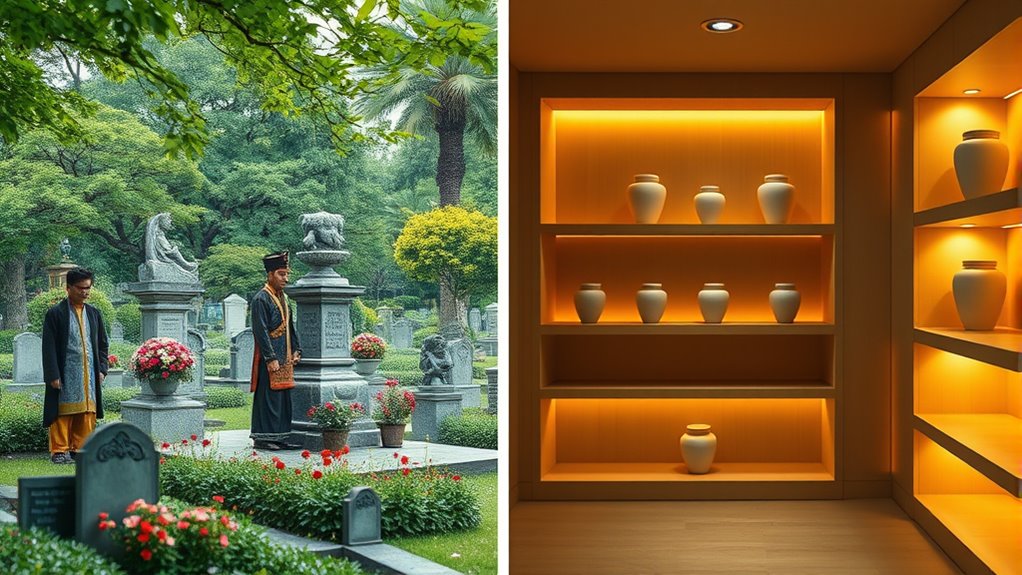Choosing between burial and cremation depends on your cultural beliefs and financial situation. Burial often holds deep traditional and religious significance, offering a physical resting place, but comes with higher costs for caskets and maintenance. Cremation is usually more affordable and eco-friendly, with options for personalized memorials and less land use. Understanding these cultural and cost factors can help you make an informed decision—if you explore further, you’ll discover even more about these options.
Key Takeaways
- Cultural beliefs influence preferences for burial or cremation, shaping rituals, memorials, and symbolic practices.
- Burial often involves traditional rituals, specific attire, and land use, while cremation symbolizes spiritual liberation.
- Burial tends to be more expensive due to costs like caskets and land, whereas cremation offers a more affordable alternative.
- Eco-friendly cremation options reduce land use and environmental impact compared to traditional burial.
- Modern adaptations, such as virtual memorials and personalized ceremonies, blend tradition with cost-effective, sustainable practices.
Cultural Significance of Burial and Cremation Practices
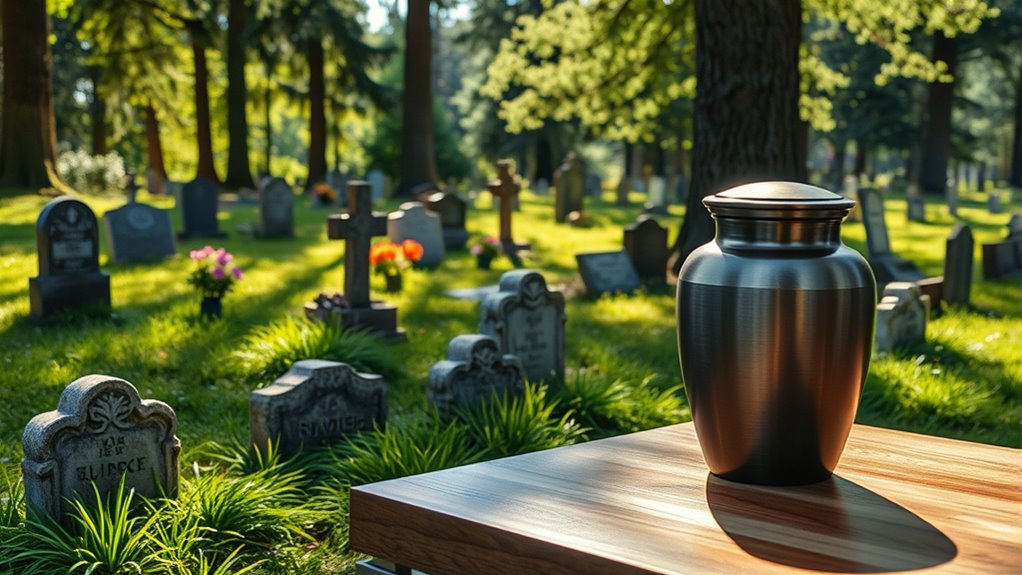
Cultural beliefs and traditions deeply influence how societies approach burial and cremation practices. You might notice that funeral music and memorial ceremonies play a crucial role in honoring the deceased, reflecting cultural values and collective memories. In some cultures, burial is seen as essential for providing a resting place, where family and community gather for memorial ceremonies that include specific rituals and songs. Conversely, cremation may symbolize purification or spiritual liberation, shaping the way memorials are held. These practices help communities process grief while reinforcing cultural identity. Understanding these traditions reveals how deeply intertwined they are with societal values, shaping not just the act of saying goodbye but also the way families remember and honor their loved ones. Incorporating vintage decor elements into memorial settings can also highlight the importance of tradition and history in these rituals.
Religious Perspectives and Rituals
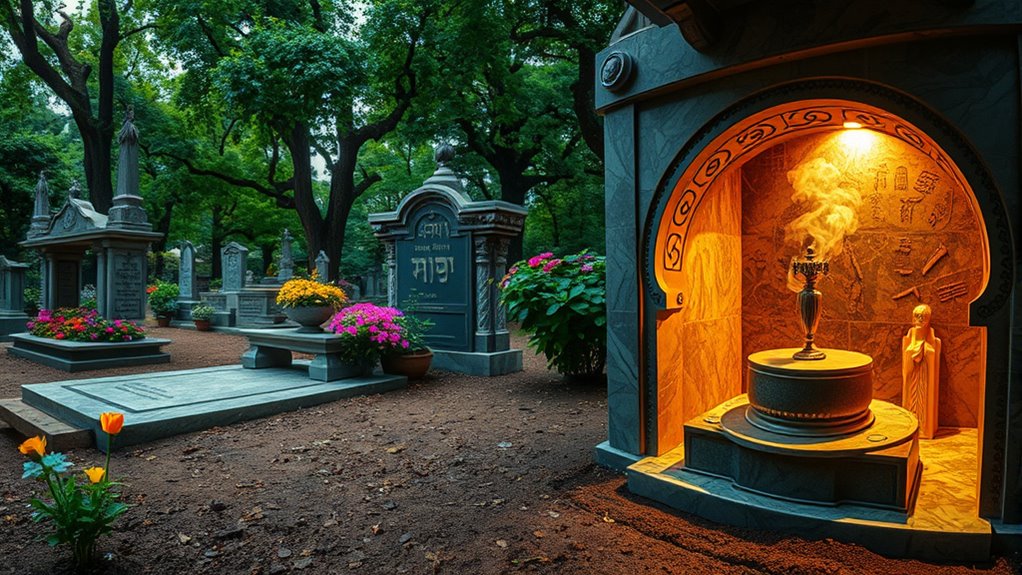
Religious beliefs fundamentally shape how communities approach burial and cremation, guiding the rituals and practices that honor the dead. You’ll notice that funeral attire often reflects spiritual values or traditions, such as white garments in some cultures or simple clothing to symbolize humility. Memorial symbols, like crosses, prayer beads, or specific icons, carry deep religious significance and help mourners connect with their faith. For many, these rituals reinforce beliefs about the afterlife or spiritual passage, influencing whether they prefer burial or cremation. Religious doctrines may specify how the body should be handled, dictating customs that uphold faith-based principles. Additionally, the influence of spiritual connection to land and ancestors plays a vital role in some cultures’ choices between burial and cremation, emphasizing the importance of tradition and ancestral ties in funeral practices. Understanding these perspectives helps you appreciate why certain practices are central to different faith communities, shaping the way they honor their loved ones.
Economic Considerations and Budgeting
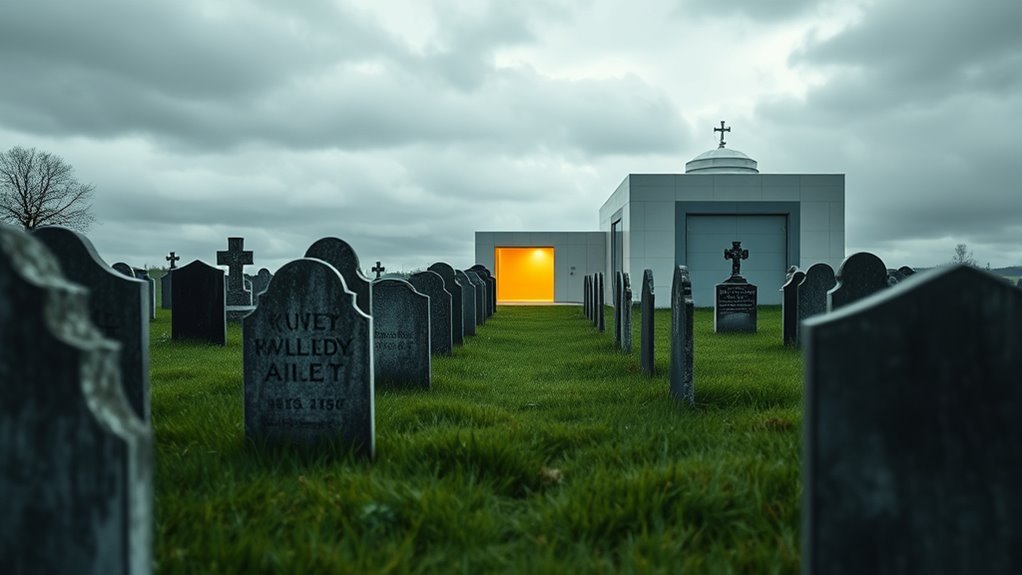
Economic considerations play a crucial role in deciding between burial and cremation, as they directly impact the overall cost and budgeting for final arrangements. Burial expenses tend to be higher due to costs like caskets, cemetery plots, and maintenance fees. Cremation, on the other hand, generally offers a more affordable option, with lower expenses for the process itself and fewer associated costs. If budget constraints are a concern, you might explore funeral financing options to manage expenses more comfortably. Planning ahead allows you to compare costs and choose a method that fits your financial situation. Being aware of these financial factors helps you make an informed decision without sacrificing dignity or respect for your loved one. Additionally, understanding cost factors involved in each option can help you make a more comprehensive financial plan.
Environmental Impact and Sustainability
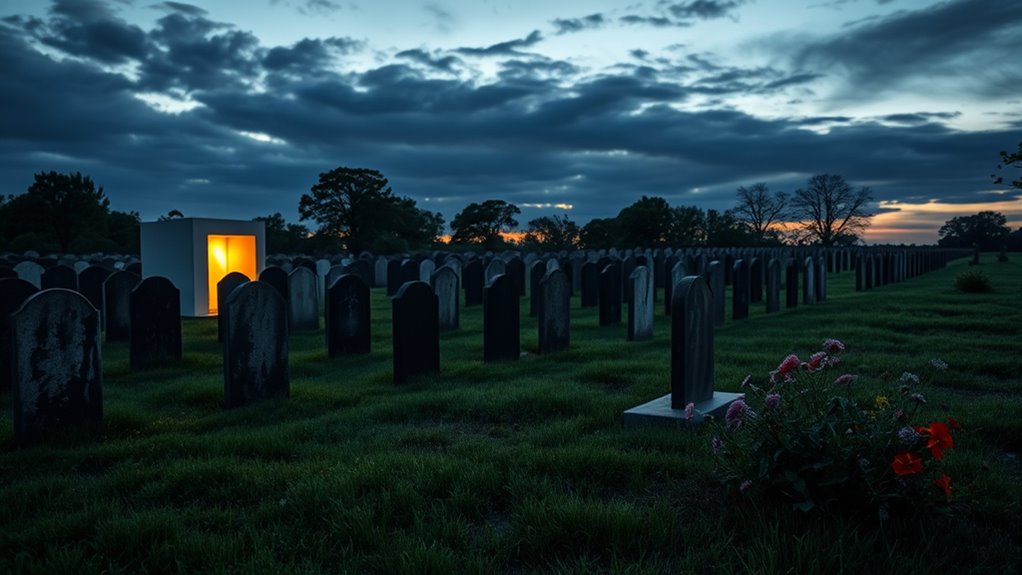
Choosing between burial and cremation also involves considering their environmental footprints. Cremation typically consumes less land and can be more eco-friendly if you choose options like bio-cremation or other eco-friendly methods. However, traditional cremation releases greenhouse gases, which impact the environment. Burials, on the other hand, require land use and often involve embalming fluids containing chemicals that can harm ecosystems. To promote resource conservation, eco-friendly options like biodegradable caskets and natural burials are gaining popularity. These alternatives reduce chemical use and minimize land disturbance. Additionally, vertical storage solutions and other organization strategies can help manage memorial items and reduce clutter associated with funeral tributes. Ultimately, your choice can align with your commitment to sustainability, helping you lessen your environmental impact while honoring your loved ones. Both options have ways to be more sustainable, so consider what aligns best with your values.
Adapting Traditions in a Modern Context

As society evolves, so do the ways we honor and remember loved ones, blending time-honored traditions with modern sensibilities. You can see this in funeral customs adapting to contemporary needs. Here are four ways people are making these traditions more personal and meaningful:
- Using virtual memorials to include distant friends and family.
- Incorporating eco-friendly practices like biodegradable urns and sustainable caskets.
- Personalizing ceremonies with favorite music, photos, or digital slideshows.
- Embracing cremation as a flexible option that allows for keepsakes or scattering.
- Many funeral practices are influenced by retail hours and services, making planning and arrangements more accessible and convenient for families.
These modern adaptations help keep traditions relevant, allowing you to honor loved ones in ways that reflect your values and current lifestyle, while still respecting cultural heritage.
Frequently Asked Questions
How Do Burial and Cremation Options Vary Across Different Cultures?
You’ll find that burial and cremation options differ widely across cultures due to unique funeral rituals and cultural symbolism. In some societies, elaborate burial ceremonies honor ancestors, while others favor cremation for spiritual reasons or practicality. These practices reflect deeply held beliefs about life and death. By understanding these cultural variations, you can appreciate how funeral rituals serve as meaningful expressions of identity and respect for the departed, shaping choices around final arrangements.
What Legal Regulations Influence Burial and Cremation Choices Worldwide?
You need to understand that legal regulations, like legal permits and jurisdictional restrictions, heavily influence your burial or cremation choices worldwide. Laws vary by country and region, dictating how and where you can conduct these procedures. You might require specific permits for burial or cremation, and certain jurisdictions may restrict options based on environmental or religious considerations. Always check local laws to verify your wishes comply with legal requirements.
How Do Personal Beliefs Affect Preferences for Burial or Cremation?
Your personal beliefs, shaped by religious convictions and values, strongly influence whether you prefer burial or cremation. If your faith emphasizes specific rituals or doctrines, those will guide your choice. Personal values, like environmental concerns or simplicity, also play a role. You might opt for cremation due to its perceived eco-friendliness or choose burial for traditional or spiritual reasons. Ultimately, your beliefs help you decide what aligns best with your worldview.
Are There Hybrid or Alternative Memorial Options Combining Burial and Cremation?
You might consider hybrid memorials or alternative rituals that blend burial and cremation options. These arrangements let you honor loved ones uniquely, such as combining cremation with a traditional burial or creating a memorial that incorporates elements of both. By exploring these alternatives, you can personalize your farewell, respecting personal beliefs and traditions while offering a meaningful tribute. These options provide flexibility and creativity in memorializing someone special.
How Do Advancements in Technology Impact Traditional Burial and Cremation Methods?
Imagine a future where biotech innovations revolutionize how you say goodbye. Advances in technology now enable eco-friendly procedures that reduce environmental impact, like water-based cremation and biodegradable caskets. These innovations make traditional burial and cremation more sustainable and efficient, giving you greener options. You can choose methods that align with your values while benefiting from safer, cleaner, and more innovative ways to honor loved ones.
Conclusion
Choosing between burial and cremation isn’t just about cost or tradition; it’s about balancing your values with practicality. While burial offers a sacred, eternal resting place, cremation provides flexibility and affordability. Both carry deep cultural significance and environmental impacts. In the end, your decision reflects what matters most—lasting tradition or sustainable simplicity—highlighting that life’s final act can be as meaningful as the journey that led here.
